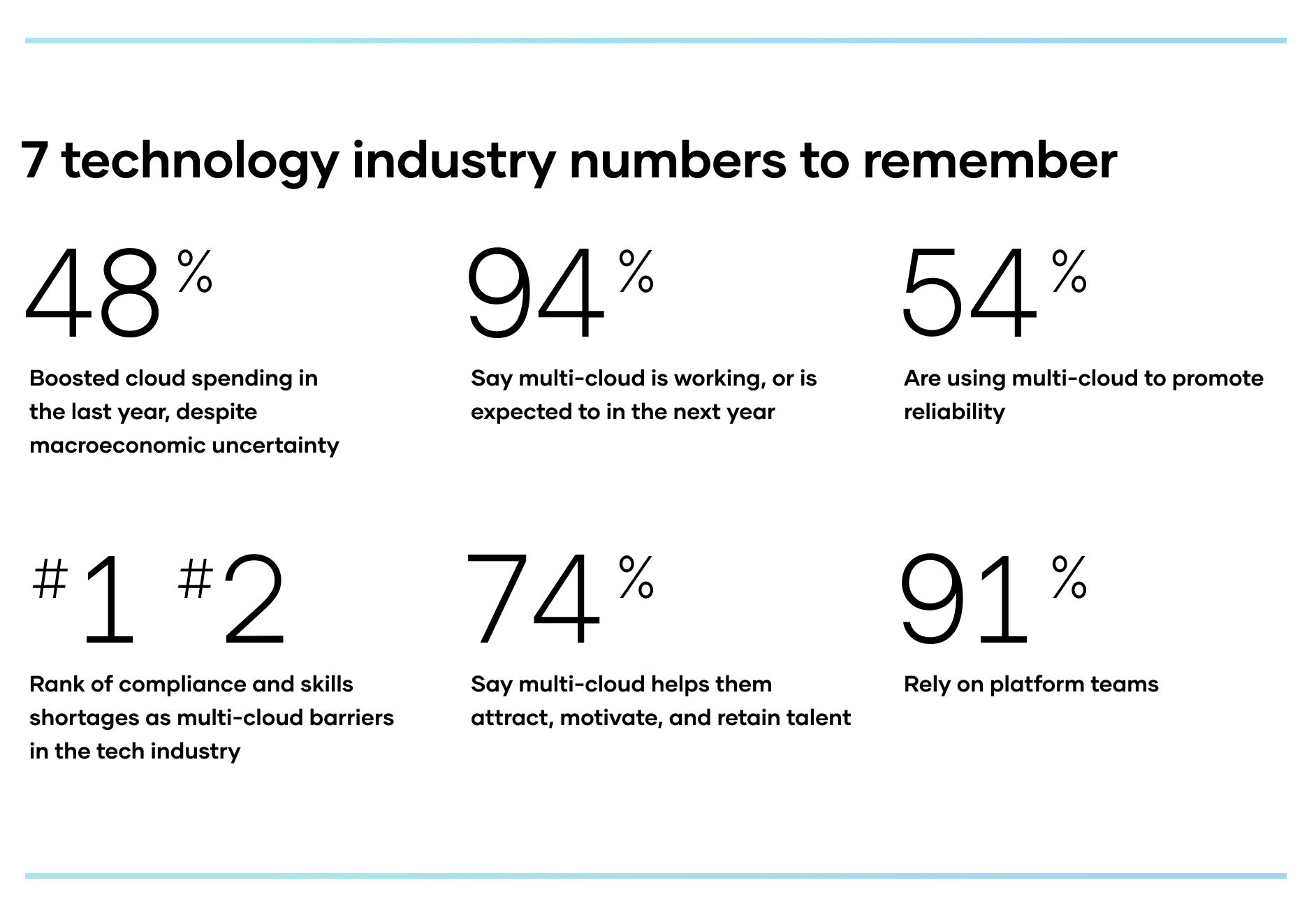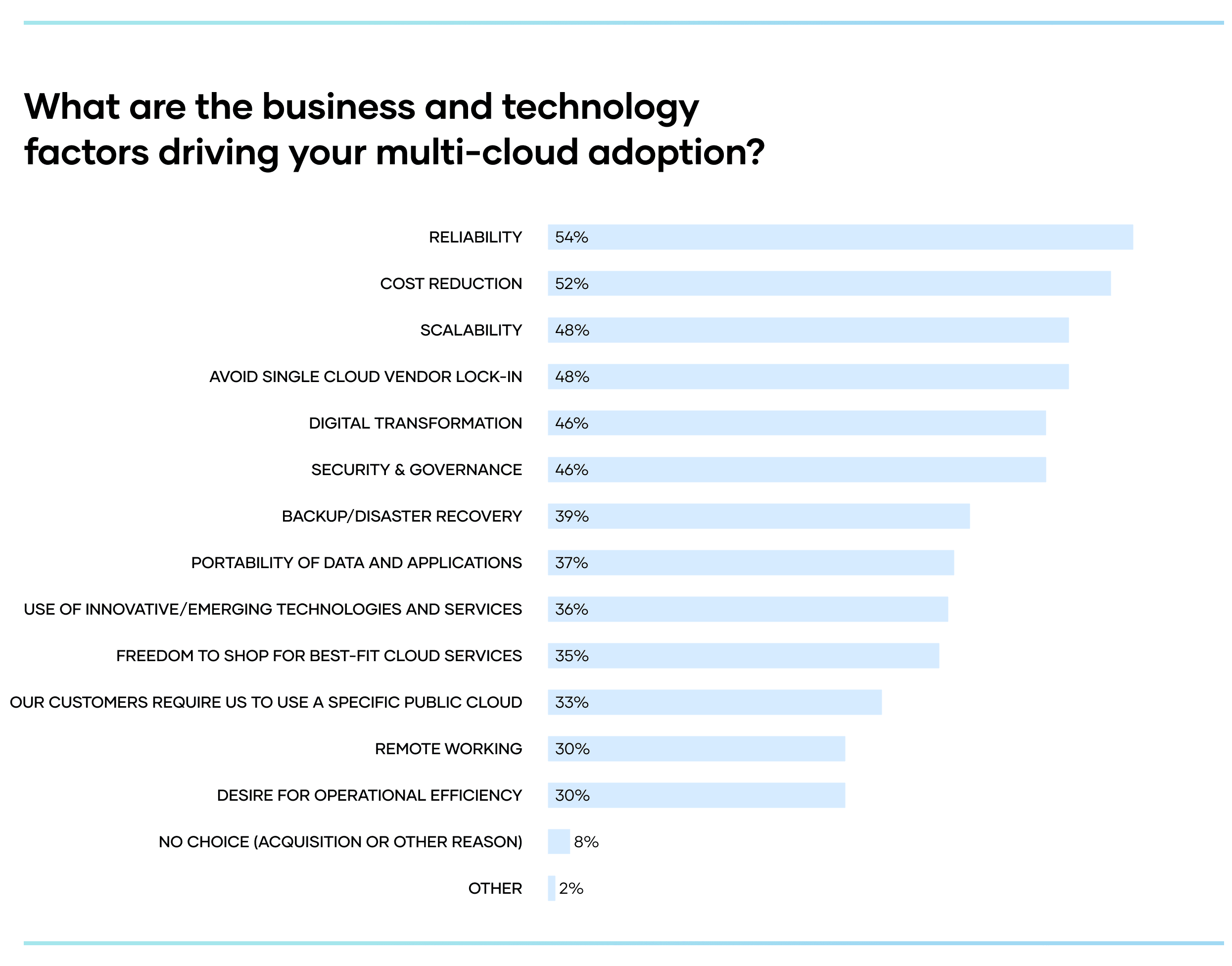The third annual HashiCorp State of Cloud Strategy Survey reveals the continued evolution of enterprise cloud strategy among companies in the technology industry. The 2021 survey welcomed enterprises to the multi-cloud era, demonstrating the prevalence of a common multi-cloud operating model. The 2022 results reiterated those findings and underscored how a multi-cloud approach is delivering meaningful business value.
For 2023, we once again commissioned Forrester Consulting to conduct the survey. In addition, we worked with Forrester to develop a cloud maturity model for describing where organizations are in their cloud adoption journey. And we were able to break out the overall results for key industries, including the technology industry.
You can see the results of the global survey, learn more about the maturity model, and access the full Forrester Consulting study at https://www.hashicorp.com/state-of-the-cloud, but this blog post shares key results specifically for the 242 global respondents in the technology and/or technology services industries (out of a total sample size of 963, drawn from a variety of industries around the world).
The results were clear: More than 9 out of 10 technology firms are seeing business and technological benefits from their multi-cloud approach, or expect to within the next year. Those Multi-cloud drivers include everything from boosting reliability to reducing costs to improving scalability. And almost three-quarters of tech industry respondents say their multi-cloud strategy helps them attract, motivate, and retain talent.
Let’s take a deeper dive into the numbers:

»48% Of tech industry respondents boosted their cloud spending
Despite worldwide macroeconomic uncertainty, almost half of technology firms increased their cloud spending in the last 12 months. Less than a quarter (23%) cut their spending. Some of the additional spending is no doubt due to inflation, but even as tech companies work to improve governance, risk management, and compliance (GRC) to cut waste with individual cloud service providers, the secular trend is so powerful that their overall cloud investments continue to grow.
The current macroeconomic environment has led us to reassess our cloud strategies and make adjustments to ensure we are able to operate efficiently, securely and cost-effectively in a rapidly changing environment. — Vice President of Cloud at a North American technology firm
The current macroeconomic environment has had a significant impact on our organization's cloud strategy. The scalability of cloud computing allows us to grow effectively and take advantage of economies of scale, saving money in the process. Additionally, the global reach of cloud computing enables us to access resources from anywhere in the world. Analyzing the macro environment is an important part of strategic management, and COVID-19 has changed the way businesses operate. Our organization has taken these factors into account when developing our cloud strategy. — Vice President of Cloud at a Latin American technology firm
If anything, the macro economic environment is indicating we should minimise long term commitments for datacenters and hardware and leverage IaaS solutions to make it easier to downgrade if required. — Vice President of Cloud at an Asia-Pacific technology firm
»94% Of tech industry respondents say multi-cloud works
Almost three-quarters (74%) of technology firms say their multi-cloud strategy has already advanced or achieved their company’s business goals, and another 20% expect it to do so in the next 12 months. Those numbers top the already robust 90% of respondents from other industries who said multi-cloud is already helping (72%) or expected to help (18%) them achieve their business goals.
The right cloud strategy supports core business and innovation in any hybrid multi-cloud. — Vice President of Cloud at a North American tech firm
»54% Of tech firms are using multi-cloud to promote reliability
Among technology industry respondents, reliability (54%) topped the list of business and technology factors driving multi-cloud adoption, followed by cost reduction (52%). Scalability (48%) and avoiding single-vendor lock-in were tied for third at 48%, while security & governance and digital transformation (46%) were tied for fifth place. Non-tech respondents, meanwhile, most often cited reliability (50%), scalability (45%), use of innovative/emerging technologies and services (45%), cost reduction (46%), and security & governance (45%). The big differences: tech companies were far more likely than other respondents to cite avoiding vendor lock-in (48% to 34%) and much less likely to mention innovative/emerging technologies (36% to 45%).

Base: 242 respondents who identified as being in the technology and/or technology services industries..
The scalability of cloud computing allows companies to grow effectively. — Vice President of Cloud at a North American technology firm
»#1 and #2 Rank of uptime and infrastructure scaling as multi-cloud success factors in the tech industry
The ability to deliver uptime and availability topped the list of multi-cloud success factors for survey respondents in the technology services industry, with 91% of tech respondents calling them either important (35%) or very important (56%). Infrastructure scaling, meanwhile, was also called important (43%) or very important (48%) by 91% of tech respondents.
Tech respondents also gave high rankings to budget (89% important or very important), security (88%), and meeting regulatory/compliance requirements (86%). Notably every one of the 12 choices presented were called important or very important by at least 74% or more of tech respondents, showing that the industry sees a broad set of multi-cloud benefits.
For comparison, non-tech respondents most often named security (87% important or very important), followed by uptime/availability, infrastructure scaling, and staffing/skill level (all at 81%) as multi-cloud success factors.
Cloud computing has the potential to be one of the most transformative economic innovations and to scale resources quickly, increase portability and accessibility, reduce costs, and increase security as well as productivity. — Vice President of Cloud at an Asia-Pacific technology firm
»#1 and #2 Rank of compliance and skills shortages as multi-cloud barriers in the tech industry
Compliance and risk management was the most commonly ranked factor (29%) complicating an organization's ability to operationalize multi-cloud. Close behind, however, were skills shortages and teams working in silos, i.e., no/low collaboration, lack of shared or straight-through processes (both ranked by 28% of tech respondents). That makes sense, given the ongoing shortage of skilled cloud talent for companies across the entire cloud maturity spectrum. Respondents from other industries, meanwhile, most often ranked skills shortages (27%), training (26%), and siloed teams (26%) as multi-cloud complicating factors.
»74% Of tech companies say multi-cloud helps them attract, motivate, and retain talent
In response to skills-shortage barriers noted above, almost three-quarters of technology industry respondents are finding that their multi-cloud approach is helping them attract, motivate, and retain the talent they need, while, another 8% expect their multi-cloud strategy to help them do so in the next year. Those results exceed the non-tech responses, where 68% reported gaining staffing benefits from multi-cloud, and another 16% expect to receive those benefits in the next year.
»91% of tech firms rely on platform teams
Centralized platform teams are increasingly ubiquitous as an organizational approach to enable the adoption and operation of cloud. The process is not yet complete, however, as of the more than 9 in 10 of tech firms respondents using platform teams in their organization, 18% are adopting them, 33% are standardizing on them, and 39% are scaling platform teams throughout the organization. For comparison, among non-tech respondents, 17% are adopting platform teams, 36% are standardizing on them, and 39% are scaling them across the organization.
Platform teams provide increased efficiency and standardization, improved security, better cost management, enhanced collaboration and knowledge sharing, and faster time to market. — Vice President of Cloud at an Asia-Pacific technology company
Multi-cloud adoption is much easier with platform teams. — Vice President of Cloud at a Middle Eastern technology company
Key benefits are centralized tool management by offering a unified platform to manage the complete software development lifecycle. A platform team offers a single interface to manage all the aspects of a delivery pipeline while providing interactions with other tools and services to aid infrastructure teams in effectively carrying out their tasks and responsibilities. — Vice President of Engineering at a North American technology firm








